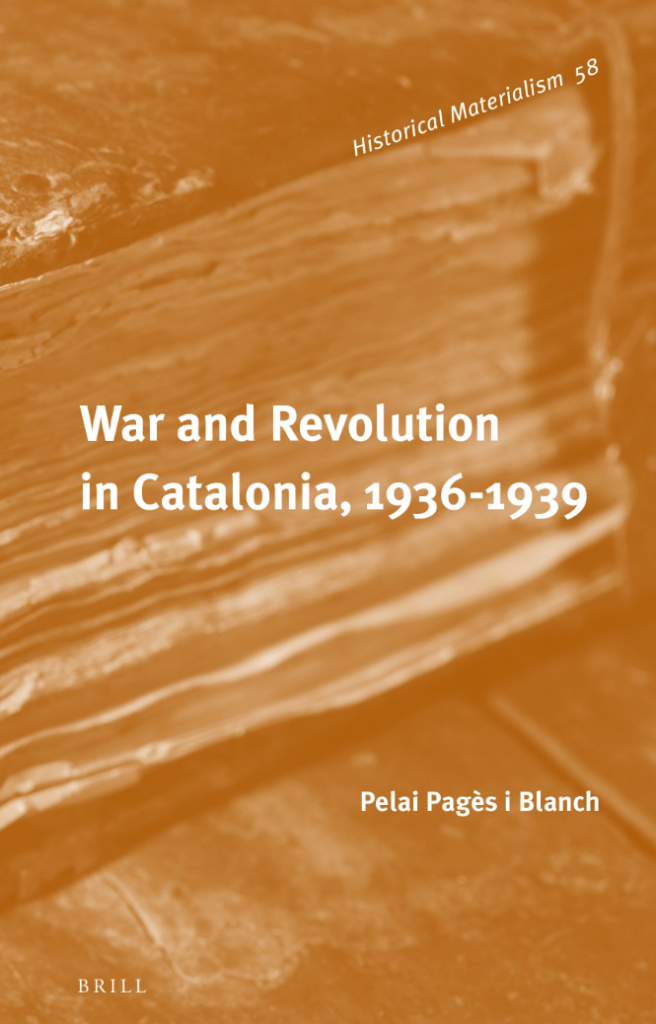Pelai Pagès i Blanch, University of Barcelona. Translated by Patrick L. Gallagher, Kent State University
In War and Revolution in Catalonia, 1936-1939, Pelai Pagès i Blanch analyses the political and military evolution of the events in Catalonia during the Spanish Civil War: the street battles that defeated the military rebellion; the social revolution that pervaded all levels of Catalonia’s politics, economy, and culture; the gradual erosion of workers’ power, culminating in the May Events; and Catalonia’s eventual fall to Franco’s forces. Pagès i Blanch demonstrates the extent to which the war was lost when the Republican leaders, in order to ‘unify’ the left against Franco and fascism, turned their backs on the social revolution. This translation of Pagès i Blanch’s landmark study is the first full-length monograph in English to focus on Catalonia’s experience during the war.
English translation of Cataluña en guerra y en revolución, Ediciones Espuela de Plata, 2007.
Biographical note
Readership
Reviews
Wouter van Dijk, Heridtitas Nexus, 2 April 2015
“[…] a welcome counterpoise to right-wing historiographical influence that survived Francisco Franco’s 1975 death by three decades, […]
Summing up: Recommended,. Upper division undergraduate and above.”
J. Daley, Choice, June 2014, Vol. 51, No. 10.
Table of contents
Introduction
1. Precursors to War and Revolution in Catalonia
2. The Military Uprising and the Failure of the Rebellion
3. Political Transformations: the Crisis of the Generalitat and the Formation of the Militia-Committees
4. The Formation of the Popular Militias and the Aragon Front
5. Public Order and Political Repression in the Rearguard
6. The Republican Justice-System: From Popular Tribunals to Special Tribunals
7. Social and Economic Transformations
8. The War-Economy and the War-Industries
9. Forming the Unity-Government and the First Political Disagreements
10. The May Events of 1937
11. The Consequences of the May Events
12. The Republican Military-Offensives, Summer 1937
13. The Negrín Government in Barcelona and the Rupture of the Catalan Front
14. The Battle of the Ebro and the Deterioration of Conditions in the Rearguard
15. The Occupation of Catalonia and Losing the War
Conclusion: The Historical Significance of the Republic’s Defeat
Appendix of Documents:
A. ‘The Failure of the Military Insurrection in Barcelona’, La Vanguardia, 22 July 1936
B. Manuel Moragues, ‘The Formation of the Catalan Central Committee of Antifascist Militias’, La Publicitat, 2 August 1936.
C. ‘Popular Militias on the Aragon Front’, Crònica diària, 24 July 1936
D. ‘Public Order in the Catalan Rearguard’, Crònica diària, 24 October 1936
E. ‘The Municipalisation of Housing’, La Vanguardia, 19 June 1937
F. The Fatarella Incidents:
From the CNT’s Solidaridad Obrera, 26 January 1937
From the UGT’s Las noticias, 28 January 1937
G. The May 1937 Events. From Crònica diària, 3, 4 and 5 May 1937
H. ‘Repression Against the POUM’, letter from jailed members of the POUM
I. Francisco Franco and Ramón Serrano Suñer, ‘The Abolition of the Catalan Autonomy Statute’, Boletín Oficial del Estado, 8 April 1938
J. ‘The Battle of the Ebro’, La Humanitat, 30 July 1938
K. ‘Disagreements Between the Generalitat and the Republican Government’, La Vanguardia, 1 October 1938
L. ‘Bidding Farewell to the International Brigades’, La Humanitat, 29 October 1938
M. ‘The Last Armed Resistance’, editorial published in the PSUC daily newspaper, Treball, 21 January 1939
N. Franco occupies Catalonia:
Fidel Dávila Arroyo, La Vanguardia, 27 January 1939.
Elíseo Álvarez Arenas, La Vanguardia, 28 January 1939
Bibliography
Index

